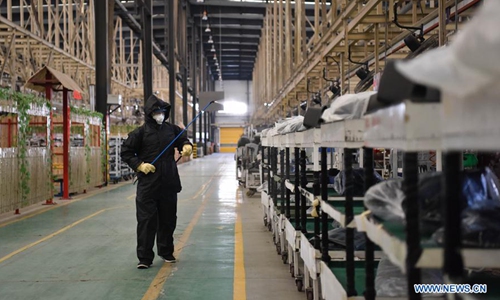HOME >> SOURCE,SPECIAL-COVERAGE
Endless paperwork, restrictions, shortages – Businesses face daunting difficulties in resuming work
By Wang Cong and Song Lin Source:Global Times Published: 2020/2/17 18:00:04

A worker disinfects the factory of Chang'an Automobile in Dingzhou, north China's Hebei Province, Feb. 16, 2020. Companies in Dingzhou resumed production with epidemic prevention measures during the outbreak of the novel coronavirus. (Xinhua/Zhu Xudong)
Factories and businesses in China anxious to restart operations after an extended closure and heavy losses due to the outbreak of the coronavirus are faced with tremendous risks and challenges, from lengthy applications to tough restrictions and shortages in cash, labor and supplies.
Many of the risks and obstacles are a result of the epidemic itself, but a large number of them are also the side-effects of the intense campaign officials across the nation have waged to rein in the outbreak, despite vows by them to step up support for companies to revive economic activity, according to business owners, analysts and media reports.
On Monday, a screenshot of what appears to be an application from a company in Luzhou, Southwest China's Sichuan Province, went viral on social media. The application to resume operations contained a total of nine stamps - one appears to be the company's own and the other eight came from various departments in the city, including the official in charge of the city's efforts against the epidemic.
The screenshot became a symbol that highlighted the mounting obstacles businesses face in resuming operations as the epidemic hasn't yet been fully brought under control.
"These are the unintended consequences of the battle against the epidemic: the restrictive measures put in place to stop the virus have also restricted companies from resuming production," said Tian Yun, director of the China Society of Macroeconomics Research Center, "In some places, officials have taken the battle to a whole new, unnecessary level."
While top officials have directed local governments to help businesses resume operations as soon as possible, many local officials have shown no sign of dialing back, mostly because they fear that allowing business operations could potentially worsen the epidemic and they will be held responsible, analysts said.
"While the central government released a slew of policy documents in support of resumption of operations, it is local officials whom businesses will face in resuming operations," Tian said.
Some companies have to submit as many as 21 documents, including a 15-page application form, plans for operations and emergencies and two letters of commitment, to local officials, according to the Xinhua News Agency.
And even if they receive the approval stamps, that's just the beginning of an array of obstacles they will have to overcome before they can resume operations.
"Even after the government issues a notice that we can start operations, only 10 percent of workers have returned and we can only reopen some production lines," Chen Liang, general manager of Dongguan Jinconn New Material Holdings, told the Global Times on Monday.
Chen said that many workers are held up back home due to travel restrictions as part of the battle against the epidemic, and the company is short of cash and unable to cover one third of its operating costs.
Workers also have to go through a daunting process to obtain a health certificate from officials in their hometown before they can travel to work, according to some media reports.
All the measures added up to significantly increased operating costs for businesses. Companies have to purchase protective gear for workers and the prices of such equipment and other supplies from food to materials have all jumped because of shortages, analysts said.
Even if they obtain government approval, all their workers return and they have enough capital, some businesses are still reluctant to resume operations because of the uncertainty over the epidemic and risks of potential infections at their operations, according to Cao Heping, a professor of economics at Peking University in Beijing.
"They will have to consider what happens if there are infections at the company. Not only will they be liable, they can face tough punishments under the current situation," Cao told the Global Times on Monday.